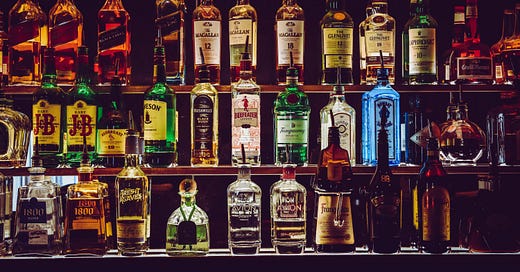The Alcohol Industry in Trouble, Target and DEI, Supermarket Dynasty, and More.
News from the Hispanic World at One Click
Welcome! La Chapulina Verde is bilingual. Every article is available in English and Spanish. Enjoy reading in your preferred language. Keep up to date and follow us on our social networks! Instagram, Threads, Facebook, and YouTube.
The Alcohol Industry in Trouble
Should we drink or smoke?
In recent years, the US alcohol industry has seen significant changes in consumption patterns, influenced by various social, economic and cultural factors. During the pandemic, a notable increase in alcohol consumption was observed, as many Americans turned to alcoholic beverages as a coping mechanism for stress and uncertainty. Recent studies indicate that this increase persisted even after the most critical phases of the pandemic.
However, starting in 2023, the industry began to face significant challenges. The distribution of different types of alcoholic beverages suffered significant declines in the percentage of consumers, with 2023 being the most unfavorable year for the US alcohol industry since 1991.
Several factors contribute to this trend. Growing health awareness, especially among younger consumers, has led to a decrease in alcohol consumption. 52% of Americans aged 18 to 34 believe that even moderate alcohol consumption is harmful to health, a significant increase from 34% five years ago.
This decline has coincided with a doubling of the share of Americans who smoke marijuana, with young people being the most likely to smoke.
Similarly, GLP-1 drugs such as Ozempic, which curb users’ appetite, can also lead to lower alcohol consumption.
Economic concerns also play a crucial role. In the first seven months of 2024, US spirits sales declined by 3%, despite a seemingly improved economic environment. Vodka, rum and Scotch whiskey were some of the hardest hit categories.
Competition from cannabis, whose legalization has expanded in several states, and the growing popularity of non-alcoholic drinks and low-alcohol options, have further challenged the traditional alcohol beverage industry.
Target and DEI
Programs driven by the BLM movement are under threat.
Target has announced a significant reduction in its diversity, equity, and inclusion (DEI) programs, joining other major corporations that have taken similar steps in response to political and social pressures. This decision includes ending its three-year DEI goals, suspending reporting to external organizations such as the Human Rights Campaign’s Corporate Equality Index, and eliminating a program aimed at increasing product offerings from Black-owned and other minority-owned businesses.
Kiera Fernández, Target’s Chief Community Impact and Equity Officer, informed employees that this move is based on "years of data, insights, listening, and learning" and aims to align the company with the "evolving external landscape." Despite these changes, Fernández emphasized that Target will continue promoting diversity within its workforce and in its customer relationships.
This decision comes as several companies, including Walmart, Amazon, and Meta, have scaled back their DEI commitments. These actions are influenced by pressure from conservative groups and recent political decisions, including executive orders from former President Donald Trump seeking to eliminate DEI programs in federal agencies and encouraging private companies to follow suit.
Target’s move has drawn criticism, especially given that the company had strengthened its DEI commitments following the 2020 killing of George Floyd, an event that occurred near its Minneapolis headquarters and prompted the company to intensify efforts in this area. At the time, Target pledged to increase Black employee representation by 20% and invest over $2 billion in Black-owned businesses by 2025.
The reduction in DEI initiatives has also impacted Target’s philanthropic relationships. Organizations such as Twin Cities Pride have rejected the company’s sponsorship, questioning its commitment to LGBTQIA+ inclusion and equity. Additionally, progressive groups have called for a boycott of Target and urged consumers to directly support minority-owned brands.
Despite the trend of some corporations scaling back DEI programs, others, like Costco, have maintained their commitment to these initiatives. Recently, Costco shareholders overwhelmingly rejected a proposal to assess the risks associated with DEI efforts, signaling continued support for inclusion policies.
Supermarket Dynasty
A Story of Growth
Humble Beginnings and Entrepreneurial Vision
The story begins with Juan González, who emigrated from Mexico to Los Angeles in the 1970s. With modest savings, he opened a small grocery store in a predominantly Latino neighborhood. From the start, Juan focused on offering authentic products that resonated with the immigrant community, creating a space where customers could find flavors and goods from their homeland.
The Role of Education in Expansion
Recognizing the value of education, Juan and his wife María emphasized the importance of their children, Carlos and Elena, earning college degrees. Carlos studied Business Administration at the University of California, while Elena specialized in Marketing at California State University. The skills and knowledge they acquired were instrumental in the expansion of the family business.
Innovations and Growth Strategies
With Carlos and Elena joining the business, the original store underwent a significant transformation. Carlos implemented modern management systems, optimized the supply chain, and established relationships with key suppliers. Meanwhile, Elena developed marketing strategies aimed at attracting a broader customer base, including social media campaigns and community events. These initiatives not only increased the customer base but also strengthened customer loyalty.
Diversification and Market Adaptation
As the Latino community in Southern California grew and diversified, the González family adapted their offerings to meet the needs of different cultural groups. They introduced products from other Latin American regions and hired bilingual and multicultural staff to better reflect their clientele. Additionally, they implemented employee training programs, emphasizing the importance of customer service and cultural awareness.
Community Commitment and Social Responsibility
The family has always maintained a strong commitment to the community that supported them from the beginning. They have sponsored scholarships for Latino students, organized health fairs, and partnered with local organizations to support families in need. This focus on social responsibility has solidified their reputation as community leaders and strengthened customer loyalty.
Challenges and Resilience
Over the years, the González family has faced significant challenges, including competition from large supermarket chains and economic fluctuations. However, their ability to adapt, innovate, and stay true to their core values has allowed them to overcome these obstacles and continue thriving.
Legacy and Future
Today, the González family’s supermarket chain has multiple locations across Southern California and employs hundreds of people. Carlos and Elena are preparing the next generation to take on leadership roles, ensuring that their legacy of service, quality, and community commitment endures. Education, which played a crucial role in their initial expansion, remains a fundamental pillar in their strategy for the future.
❤️ Cosas que nos encantan | ❤️ Things We Love
Sundance and Latinos
The 2025 Sundance Film Festival stands out for a remarkable presence of Latin and Latin American productions that explore diverse themes and cinematic styles. We’re excited to share them with you:
Kiss of the Spider Woman
Directed by Bill Condon, this adaptation of the 1992 musical stars Jennifer Lopez as the glamorous "Spider Woman." The story follows Molina, a gay window dresser imprisoned in 1983 Argentina, who escapes his harsh reality by imagining elaborate musical numbers. Lopez expressed that starring in a musical has been a dream come true for her.
Selena y Los Dinos
This documentary, directed by Isabel Castro, offers an intimate look at the early days of the iconic singer Selena Quintanilla and her family band, Los Dinos. Through never-before-seen footage from the family’s personal archives, the film chronicles their rise from performing at quinceañeras to selling out stadium tours, highlighting Selena’s impact on Tejano and Latin music.
It Rains Over Babel (Llueve sobre Babel)
Colombian filmmaker Gala del Sol makes her feature debut with this film inspired by Dante’s Inferno. The story follows a series of characters who cross paths with "La Flaca," the personification of death, at the mythical bar "Babel." Through these encounters, an epic and humorous narrative unfolds, exploring themes of love, betrayal, death, and redemption. The film is part of the festival’s NEXT section, dedicated to innovative and forward-thinking works.
The Virgin of La Tosquera (La Virgen de la Tosquera)
Directed by Laura Casabé and written by Benjamín Naishtat, this Argentine film is based on short stories by Mariana Enríquez. Set in the summer of Buenos Aires in 2001, it follows three friends who, after finishing school, fall for the same boy. When one of them seems to be making progress in the relationship, an older woman captures the young man's attention, complicating their dynamic. The film competes in the festival’s World Cinema Dramatic Competition.
Magic Farm
Argentine-American director Amalia Ulman presents this sci-fi film about a cutting-edge media team traveling to Argentina to profile a local musician—only to end up in the wrong country. As they collaborate with the local population to manufacture a trend, unexpected connections arise. The film is showcased in the festival’s Premieres section. See all the competitors here.








